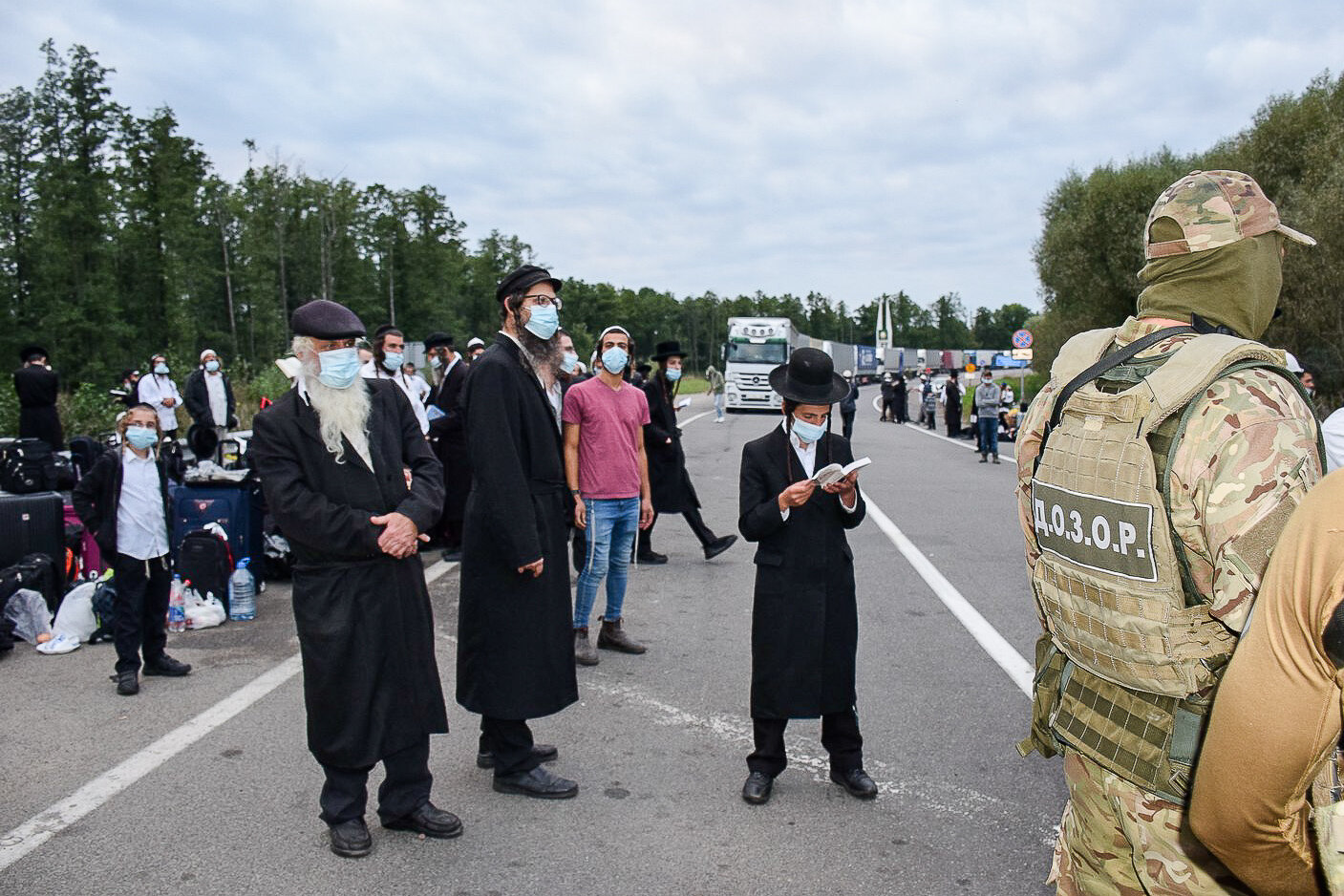Hundreds of Hasidic pilgrims have been stranded at the Belarusian border after they were denied entry into Ukraine to celebrate the Jewish new year, Rosh Hashanah, at the tomb of their sect’s founder in the city of Uman.
Ukraine has banned entry for most foreign nationals until Sept. 28 due to the worsening COVID-19 epidemic in the country. This derailed an annual tradition in which tens of thousands of pilgrims travel to Uman to pray at the gravesite of Rabbi Nachman, founder of the Breslov Hasidic dynasty, on Rosh Hashanah. This year, the holiday starts on Sept. 18.
The Rabbi Nachman of Breslav International Charity Foundation and the Belarusian Border Control Committee said 1,500 people are currently at the border between Belarus and Ukraine.
The Belarusian Society of the Red Cross has been distributing blankets, food, water, hot tea and personal hygiene products to the stranded pilgrims, who include children, women and elderly people. The organization also set up a heating tent, as temperatures fall below 10 degrees Celsius at night.
Pilgrims began arriving on the afternoon of Sept. 14. Ukrainian border guards with reinforcements from the National Guard and the National Police cordoned off the area roughly 700 meters from the Novi Yarylovychi checkpoint in Ukraine’s Chernihiv Oblast. Serhiy Deyneko, head of the Ukrainian Border Guard Service, visited the scene to tell the pilgrims that they should respect the laws of Ukraine.
Около тысячи евреев-хасидов застряли на белорусско-украинской границе между пунктами пропуска «Новая Гута» и «Новые Ярыловичи». Около 500 из них провели ночь на нейтральной территории между двумя странами. Паломников из-за закрытых границ не пускает Украина. pic.twitter.com/izqFU5MzOz
— TUT.BY (@tutby) September 15, 2020
In a Sept. 15 statement, Nathan Ben Nun, president of the Rabbi Nachman foundation, said that the pilgrims had misunderstood Belarusian border guards due to the language barrier and believed that they would be able to enter Ukraine through Belarus.
He made a plea to Ukraine’s president and prime minister “to make an exception and allow the stranded pilgrims to come to Uman for several days.”
“We are hoping for the humanity and mercy of the Ukrainian leadership for believers who got stranded at the border due to a misunderstanding,” the statement read.

Hundreds of Hasidic pilgrims have been stranded at the Belarusian border on Sept. 15, 2020, after they were denied entry into Ukraine to celebrate the Jewish new year, Rosh Hashanah. (State Border Guard Service of Ukraine)
The entry ban for foreigners came into force on Aug. 28. However, some pilgrims flew to Ukraine earlier. They were required to show a negative PCR test for COVID-19 upon arrival or to quarantine for 14 days or until testing negative.
There is also a local community of Hasidic Jews in Uman and other parts of Ukraine.
Both the Israeli and Ukrainian governments raised concerns over the risk of mass gatherings such as the Rosh Hashanah celebration, which involves collective prayers, singing and dancing.
Since late June, the numbers of COVID-19 infections, deaths and hospital admissions in Ukraine have been surging. Currently, there are over 85,600 people sick with COVID-19. Active cases have doubled in the last month.
This year, some 3,000 pilgrims are expected to celebrate Rosh Hashanah in Uman — 10 times fewer than last year.
The Ukrainian authorities have tightened security measures at the pilgrimage site and restricted mass gatherings in Uman. Crowd control barriers were installed around Rabbi Nachman’s gravesite to enforce social distancing.
On Sept. 10, the National Police and the State Migration Service of Ukraine decided to deport two Israeli citizens from Ukraine after a video appeared on social media of a group of Hasidic pilgrims fiercely rocking the barriers in an attempt to remove them.
The Uman City Council also decided to carry out mass PCR testing of everyone who arrives in the city for Rosh Hashanah. Pilgrims will have to present a PCR test result and have their body temperature measured at checkpoints at the entrance to the pilgrimage site.
According to Uman Mayor Oleksandr Tsebriy, eight pilgrims tested positive for COVID-19. They have mild symptoms and are currently isolated at a hotel that was turned into makeshift hospital for Hasidic pilgrims with coronavirus.
Israel sent six medical workers to Uman to help local doctors and nurses.
Ukraine has a history of conflicts between local residents of Uman, a city of 82,600 people in Cherkasy Oblast, and Hasidic pilgrims. The coronavirus pandemic and fears of an outbreak of infections have made these difficult relations more tense.
On Aug. 27, Uman residents clashed with several Hasids who had arrived from abroad and tried to enter the residential building in which they were going to stay.
